1,567 reads
Unique NFT Use Cases: What’s Beyond NFT Art?
by
May 15th, 2021
Audio Presented by

Technical Documentation Consultant: I help startups and scaleups create better technical documentation 📚 Pluralsight Author | DevRel | Technical Writer | Node.js / JavaScript
About Author
Technical Documentation Consultant: I help startups and scaleups create better technical documentation 📚 Pluralsight Author | DevRel | Technical Writer | Node.js / JavaScript
